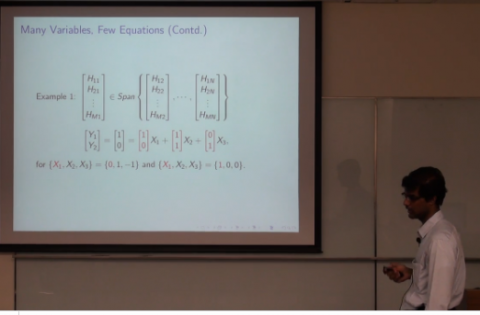
Capacity of interference networks is unknown in general. This leads to pursuit of approximate capacity of interference networks. Sum degrees of freedom (DoF) is one notion of approximate capacity of interference networks at high SNR. Cadambe and Jafar introduced Interference Alignment (IA) as a tool to achieve the sum-DoF of K-user Gaussian interference channel. Subsequently, this tool has been applied to a variety of scenarios including wireline instantaneous networks with three unicast sessions to achieve half-rate per source-destination pair.
In this talk, after an overview of IA, I shall introduce a transform technique for acyclic networks with delay. This technique, inspired by the Orthogonal Frequency Division Multiplexing (OFDM) scheme for multipath wireless channels, decomposes an acyclic network with delay into instantaneous networks. The transform technique is further coupled with IA to pursue rate guarantees in wireline delay networks with three unicast sessions, where zero-interference conditions cannot be met. Three different IA schemes for wireline delay networks with three unicast sessions will be introduced and their feasibility conditions discussed.
The results presented here are a joint work with Teja, Dr. Prasad, and Prof. Sundar Rajan at the Indian Institute of Science, Bangalore.
Abhinav Ganesan is currently a post-doctoral fellow at the Institute of Network Coding, CUHK. He finished his PhD at the Indian Institute of Science, Bangalore, India in 2014. Prior to that, he obtained his Bachelor degree in Electronics and Communication from the College of Engineering-Guindy, Anna University, India in 2009. His research interests span Wireless Communication, Information Theory and Network Coding.
